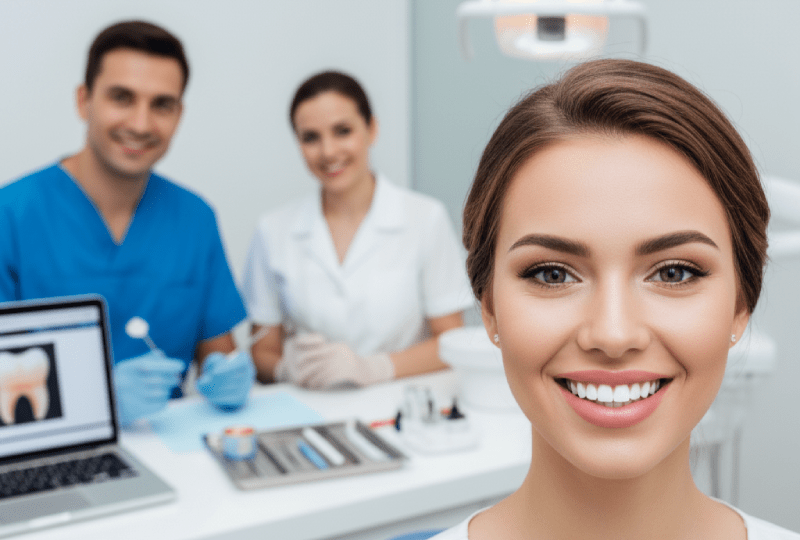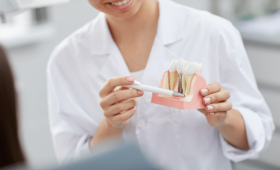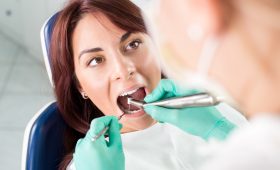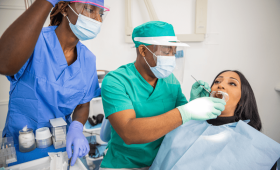What Are The Main Advantages Of Going Abroad For Smile Design?
The most significant advantage of traveling abroad for smile design or comprehensive dental treatments is the combination of cost-effectiveness and rapid treatment processes. The same high-quality porcelain veneers, zirconia crowns, or implant treatments that carry a high price tag in developed countries can be offered at much more reasonable prices in certain nations (especially Turkey).
Furthermore, because clinics focus on medical tourism, treatments that would take weeks can be condensed into a single trip, often completed within a short period like 7 to 14 days, tailored to the patient’s travel schedule. This results in substantial savings in both time and budget, making it an appealing option for international patients seeking quality and efficiency.
Is Quality Compromised When Traveling For Treatment?
Absolutely not; traveling abroad for affordable treatment does not mean compromising quality. Clinics in many popular medical tourism destinations operate with state-of-the-art laboratories and highly experienced specialists that adhere to Western standards.
The reduction in cost typically stems from the lower general operating expenses, personnel wages, and rental costs in the host country. It is crucial to choose centers that accept international patients and possess international accreditations such as ISO or JCI. Cure Holiday meticulously selects reliable centers that meet these high quality standards for you, ensuring your investment is in safe hands and you receive excellent care.
Which Countries Are Popular For Smile Design Treatment?
The countries internationally popular for smile design (cosmetic dentistry) treatments primarily include Turkey, Hungary, and Thailand, due to their cost advantage and high service quality. Turkey is one of the most preferred destinations for patients from Europe, the Middle East, and the USA, thanks to both its geographical location and the advanced development of its laboratory quality. These countries are renowned for their ability to complete treatments such as zirconia crowns, porcelain veneers, and implants within a short time frame, maximizing patient convenience and minimizing time away from home.
What Preliminary Preparations Should Be Made Before Starting Treatment?
Before starting treatment, preliminary preparations are vital to increase the chance of success and accelerate the process. Patients should submit their current dental X-rays, intraoral photographs, and a detailed summary of their medical history, outlining their desired outcomes, to the clinic or intermediary agency. This prior information enables specialists to create a preliminary treatment plan and estimated cost. Reducing smoking and alcohol consumption and maintaining excellent oral hygiene before arriving for treatment will also positively affect the success and smoothness of the entire treatment process.
What Is The Average Cost Of Traveling For Aesthetic Dentistry?
The average cost of traveling for aesthetic dentistry varies significantly depending on the scope of the procedure (e.g., just 8 veneers or full-mouth implants) and the chosen country. Generally, a package price that includes all accommodation, transfers, and treatment expenses can be 50% to 70% less than the cost of the same procedure in Western countries. For example, a complete smile design package might cost one-third of the prices in Europe, with this price difference far compensating for the travel expenses incurred.
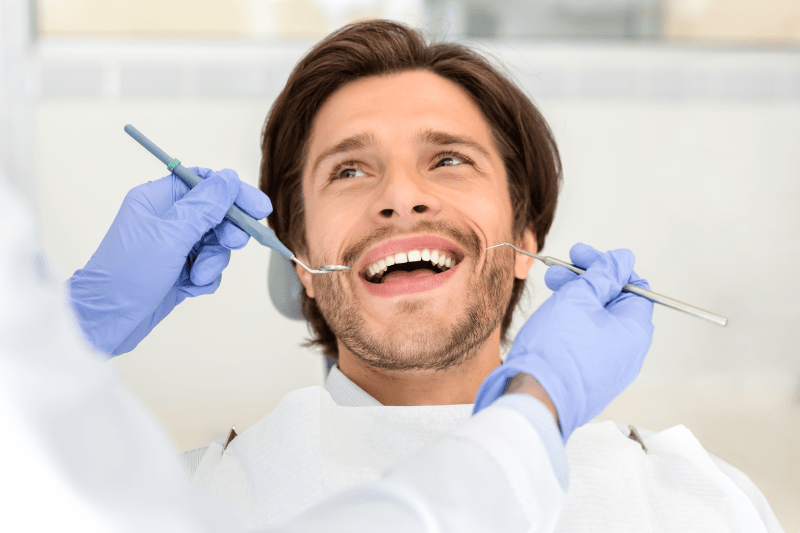
How Are Accommodation And Travel Costs Included In The Total Budget?
In international travel for treatment, accommodation and flight tickets constitute a significant part of the total budget. Most patients prefer comfortable accommodations close to the clinic for the duration of the treatment, which usually lasts 5 to 10 days. These expenses must be added to the standard treatment fee. Medical tourism agencies like Cure Holiday often offer all-inclusive treatment packages (excluding flights) that cover these costs, greatly facilitating budget management and eliminating the possibility of surprise expenditures during the stay.
What Are The Most Preferred Dental Treatment Types?
The most preferred treatments in dental tourism are typically procedures with high cosmetic outcomes and noticeable cost differences. These include Zirconia or Emax Crowns which permanently improve the color and shape of the teeth, minimally invasive Porcelain Veneers applied to the front teeth, and Dental Implants to replace missing teeth. Full-mouth restoration is also highly popular as it involves multiple complex procedures completed in a single trip, offering a comprehensive and time-saving solution.
How Much Time Does The Total Treatment Duration Take?
The total duration of a complete smile design treatment depends on the complexity of the procedure performed. For instance, veneer or crown procedures can usually be completed in 5 to 7 days with a two-stage visit. Implant treatments, however, typically require two stages due to the necessary bone healing period (osseointegration); the first stage takes 3-4 days, and the second stage after healing takes 7-10 days. The ability to accelerate these processes is one of the strongest points of medical tourism centers, allowing patients to minimize their time away from work.
How Is The Language Barrier Overcome During Treatment?
Dental centers that accept international patients provide multilingual patient coordinators and professional interpreting services to overcome the language barrier. Patients are guided by an official who can speak English (or their native language) from the initial contact until the end of the treatment. Professional interpreters proficient in medical terminology are present during critical consultations and treatment phases. Cure Holiday guarantees continuous and accurate communication throughout this process, ensuring patients feel safe and understood at every stage of their treatment journey.
What Is The Quality Of Materials Used In Treatment?
The quality of materials used in overseas treatments complies with international standards (ISO, CE) and is usually sourced from the USA or Europe. High-quality, biocompatible materials such as German Zirconia or Emax porcelain are used for crowns and veneers. Attention to ensuring that the implant brands used by the clinic are internationally certified and come with a lifetime guarantee is a significant indicator of quality. It is important to request information about the origin of the material to be used before starting the treatment to confirm the quality.
How Is Pain And Swelling That May Occur After Treatment Managed?
Pain and swelling that may occur after dental treatments are generally part of the normal recovery process and can be easily managed. Especially after invasive procedures like implant placement or tooth preparation for crowns, specialists prescribe strong painkillers and antibiotics. Applying ice during the first 48 hours after treatment helps keep the swelling to a minimum. The clinic provides detailed care and medication use instructions in writing before the patient returns to their home country to ensure a comfortable recovery.
What Should Be Considered Before Traveling For Treatment?
The most important factors to consider before traveling for treatment are the clinic’s international accreditation, the reviews and references of previous patients, and the transparency of the price quote. You must ensure that the cost of potential additional procedures (e.g., root canal treatment, tooth extraction) is clearly specified in the price quote. Furthermore, obtaining comprehensive travel health insurance for possible emergencies during the travel and accommodation period is of paramount importance to ensure financial security and peace of mind.
What Is The Guarantee For Dental Treatment Received Abroad?
Reliable international dental centers usually provide long-term guarantees for the procedures they perform and the materials they use. For example, a 5-10 year warranty for crowns and a lifetime international warranty for implants may be offered. This guarantee covers the free correction of the treatment in case of material fracture or a technical failure (provided it is not caused by patient misuse). Patients should ensure they receive the warranty terms and certificates fully before returning home.
How Are Emergencies Managed During The Dental Treatment Process?
In case of an emergency (severe pain, bleeding, etc.) during overseas dental treatment, the clinic must have an accessible 24/7 emergency line. Reliable centers offer an emergency service or an on-call doctor service close to where the patients are staying. Agencies like Cure Holiday coordinate the patient’s transfer to the clinic and rapid medical intervention during emergencies, ensuring the patient’s safety. Comprehensive health insurance before treatment will cover the costs of unexpected medical intervention.
How Is A Clinic Consultation Done Before Starting Treatment?
It is crucial for the patient to have an online video consultation with the chosen center before starting treatment. During this consultation, the patient explains their expectations, concerns, and aesthetic preferences in detail to the dental specialist. The specialist evaluates the X-rays and photographs sent by the patient, makes a preliminary diagnosis, can offer MOCK-UP (temporary modeling) options, and explains the estimated treatment plan. This initial consultation plays a critical role in establishing the patient’s trust in the clinic and the specialist.
Can Implant Treatment Be Done In A Single Trip?
Traditional implant treatment is usually performed in two stages, as 3 to 6 months of healing time is required for the implant to fuse with the jawbone (osseointegration). However, in certain special cases or in technologically advanced clinics, immediate loading methods such as “All-on-4 or All-on-6” can be used. These methods allow the patient to receive temporary teeth in a single trip. A second visit may still be necessary for the placement of the permanent teeth, and this must be clearly planned in advance.
How Many Days Should Be Planned For A Trip For Dental Crowns?
Dental crown (veneer or zirconia) treatment generally consists of two main stages, and a total trip of 5 to 8 days is ideal for these procedures. The first appointment involves preparing the teeth and taking impressions, followed by the laboratory phase. Toward the end of the trip, the crowns are tried on and permanently bonded. This process also allows the patient to supervise the highly precise work of the dental technician on-site, contributing to the final aesthetic outcome.
How Are Exchange Rate Risk And Price Fixing Managed In Medical Tourism?
Since prices in medical tourism are usually determined in Euro or Dollar, there is an exchange rate risk against the patient’s local currency. To manage this risk, patients can fix the price by making a large down payment to the clinic or benefit from packages offered by agencies like Cure Holiday that guarantee the price at the start of the treatment. A transparent price quote is crucial for minimizing unexpected costs that may arise from currency fluctuations during the payment period.
How Is Care Done After Denture Or Crown Treatment Abroad?
Care after denture or crown treatment abroad is not significantly different from normal dental care. Specialists advise the patient to maintain excellent oral hygiene, use a toothbrush and dental floss/interdental brushes regularly. Furthermore, to ensure the longevity of crowns or implants, it is necessary to avoid hard foods and not miss regular check-up appointments. The clinic prepares a detailed care protocol to be presented to the local dentist who will follow up upon return to the home country.
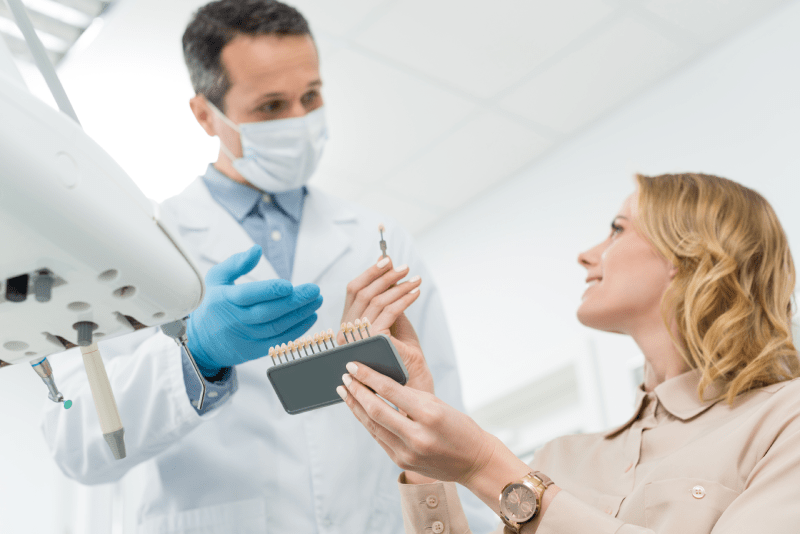
Is It Possible To Go On Holiday With Dental Treatment?
Yes, combining dental treatment with a holiday is one of the biggest attractions of medical tourism trips. Treatments usually last a few hours in the morning, and the patient has the rest of the day to explore the touristic and cultural sites of the city where the treatment is performed. Especially popular centers in Turkey like Istanbul or Antalya offer the opportunity to turn the treatment process into a relaxing and exploratory trip. This also helps reduce the stress associated with the treatment itself.
What Documents Should Be Prepared For Dental Treatment?
The essential documents that must be prepared for overseas dental treatment are: Passport or ID copies, all medical history related to the current dental situation (X-rays, previous dental records). Additionally, informed consent forms requested by the clinic and payment receipts are also important. Having English translations of all medical documents available before traveling will accelerate the clinic’s diagnosis and planning process, ensuring a smooth start to the treatment.
How Does A Hidden Infection In The Mouth Affect The Treatment?
A hidden infection (e.g., root tip inflammation or periodontal disease) in the mouth that has not been diagnosed can seriously affect and delay the smile design or implant treatment plan. It is mandatory to completely clean all infections before applying dental crowns or placing implants. If such an infection arises during the treatment, it must first be resolved with root canal treatment or tooth extraction. This situation prolongs the treatment duration and adds an extra burden to the total cost.
Why Can Overseas Clinics Provide Faster Appointments?
Overseas clinics, especially centers focused on medical tourism, have the ability to provide much faster appointments, bypassing the long waiting lists in local healthcare systems. This is because these centers set aside special capacity and fast planning protocols for international patients. This rapid appointment process makes overseas an attractive option for patients who need urgent treatment or have calendar restrictions, allowing treatment to start sooner than expected.
What Are The Advanced Technologies That Enhance Quality In Treatment?
Advanced technologies that enhance quality and precision in dental treatments include CAD/CAM (Computer-Aided Design/Computer-Aided Manufacturing) systems, which make tooth preparation and impression taking much more precise, intraoral 3D scanners (optical impressions), and Digital Smile Design (DSD) software. In implantology, robotic or navigated surgery systems are used to place the implant at the most accurate angle. These technologies maximize the predictability of the aesthetic outcome and the durability of the treatment.
How Is Experience And Expertise Checked When Choosing A Dentist?
When choosing a dentist abroad, experience and expertise are more important criteria than price. Patients should inquire about how many years the specialist has been working in this field, how many cases they complete annually, especially in the type of procedure to be performed (implant, veneer, etc.), and which international professional organizations they are a member of. Furthermore, examining the doctor’s previous “before and after” patient photographs provides a concrete idea about their aesthetic vision and technical skill.
How Do Communication And Follow-Up Processes Work During Treatment?
Communication and follow-up processes during treatment typically operate through the assigned international patient coordinator. The coordinator manages the scheduling of all appointments, answers questions during communication with the doctor, and monitors the patient’s current health status. Even after returning to the clinic, the communication channel with the patients is kept open for possible problems or questions, and remote follow-up is provided by requesting necessary visuals. This uninterrupted communication is critically important for the patient to feel secure after the treatment.
What Is The Success Rate Of Dental Implant Treatment Abroad?
The success rate of dental implant treatments performed in high-standard overseas centers is over 95% with correct diagnosis and the use of quality materials. The key factors influencing success are the quality and quantity of the jawbone where the implant is placed, risk factors like the patient’s smoking habits, and the precision of the surgical technique. The use of internationally recognized brands and the experience of specialist surgeons are the main assurances behind these high success rates.
What Are The Risks Of Traveling For Treatment And How Are They Reduced?
The main risks of traveling for treatment are unexpected complications, incorrect diagnosis or treatment plan, and organizational disruptions. The most effective way to reduce these risks is to prefer only centers with JCI or ISO accreditation and to manage all processes through an experienced agency like Cure Holiday. The agency reduces the risk of incorrect diagnosis by conducting preliminary evaluations and eliminates the financial risk of unexpected medical complications with travel insurance.
What Is The Importance Of The Dental Laboratory Used In Treatment?
In smile design, the success and aesthetic outcome of the treatment are 50% dependent on the laboratory as much as the dentist. A high-quality dental laboratory produces crowns and veneers with the most precise CAD/CAM technologies, exactly matching the intraoral 3D scans and the patient’s aesthetic expectations. International centers usually work with high-tech laboratories either within their own structure or closely supervised. The quality of the laboratory directly affects the longevity of the crown and its natural appearance.
How Do Post-Dental Treatment Check-Up Processes Work?
Post-dental treatment check-up processes are usually continued by a local dentist after the patient returns to their home country. Routine tooth and implant check-ups are required at appointed intervals (usually every 6 months). The overseas clinic provides a detailed file containing all treatment records, X-rays, and warranty certificates to be presented to the follow-up dentist in the patient’s home country. The clinic’s support for this collaboration is critically important for the long-term success of the treatment.
What Methods Are Used For Full Mouth Restoration Treatment?
Full mouth restoration (full mouth reconstruction) is generally applied in cases of advanced tooth loss or severe wear. The methods used in this comprehensive treatment include: Dental Implants (including All-on-4/6 for the entire jaw), Zirconia Crowns (for aesthetics and durability), and the establishment of a new biting pattern (occlusion) using Smile Design principles. This complex process requires the collaboration of a specialist surgeon and a prosthodontist and is usually completed in two main travel phases.
Are There Tax Advantages For Treatment Received Abroad?
In some countries, health expenditures may be covered by tax deductions or refunds. However, the situation regarding benefiting from tax advantages for treatments received abroad depends on the tax laws of the patient’s country of residence. It is important for couples to clarify this issue with a financial advisor or tax expert in their home country before starting treatment. Medical tourism agencies cannot provide legal advice on this matter but commit to providing all necessary invoices fully.
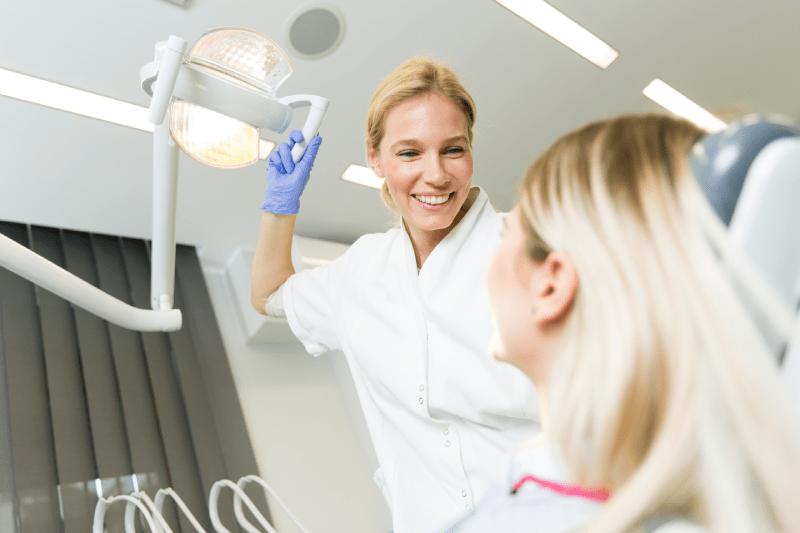
How Is Patient Comfort Ensured During The Treatment Period?
Ensuring patient comfort during the treatment period is a primary priority for international centers. This includes pain-free treatment techniques (computer-aided anesthesia), sufficient rest time between appointments, comfortable transfer vehicles, and luxurious accommodation options close to the clinic. Furthermore, additional services such as city tours or shopping organizations are also offered to ensure the patient enjoys their time outside of the treatment. This holistic approach positively influences the treatment experience.
How Is The Cost Of Technology Used In Treatment Calculated?
The cost of the advanced technology used in treatment (e.g., CAD/CAM, 3D tomography) is generally integrated into the standard package. However, some additional procedures (e.g., navigated implant surgery or laser gum treatment) may be requested as an extra fee on top of the package price. Since the clinic’s use of this technology shortens the treatment process, increases precision, and boosts patient satisfaction, these costs, in the long run, offer the advantage of guaranteeing the success of the treatment.
What Are The Benefits Of Corporate Intermediation (Cure Holiday) Services?
The benefits of corporate intermediation services are to simplify the overseas dental treatment process and increase its safety. Agencies like Cure Holiday select high-quality, accredited centers, create budget-friendly all-inclusive packages, and organize all logistical details such as accommodation and transfers. Most importantly, they offer professional interpretation and 24/7 support, preventing the patient from feeling alone abroad and immediately resolving unexpected problems that may arise.
What Should Be Considered Regarding Eating And Drinking During The Treatment Period?
Considerations regarding eating and drinking during the treatment period depend on the type of procedure performed. Patients waiting for crown or veneer fitting should avoid hard and sticky foods to protect their temporary teeth. After implant surgery, it is important to consume only soft and lukewarm foods for the first few days to support the healing process. Avoiding overly hot, cold, and acidic drinks protects the success of the treatment and reduces sensitivity.
How Should One Prepare Psychologically Before Traveling For Treatment?
Psychologically preparing before traveling for treatment is critically important for managing high expectations and stress. The patient must ensure that the treatment outcome is completely aligned with realistic expectations. Meditation or relaxation exercises can help manage the stress of being in a foreign environment and anxiety related to the treatment. Detailed planning and preliminary consultations with Cure Holiday help the patient to be psychologically ready for the process, minimizing treatment stress.
How To Start Smile Treatment Through Cure Holiday?
Starting smile treatment through Cure Holiday is very simple. The first step is to request a free preliminary consultation via the website or communication channels. During this meeting, the patient’s existing dental X-rays, photographs, and expectations are reviewed. Subsequently, the most suitable, high-quality center and all-inclusive package for your budget, aesthetic goals, and travel dates are determined. All travel and appointment organizations are handled by Cure Holiday, ensuring the patient can focus solely on their treatment.
